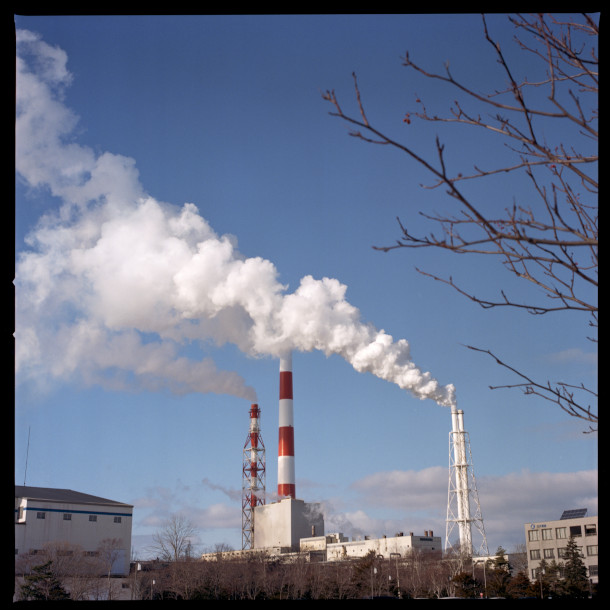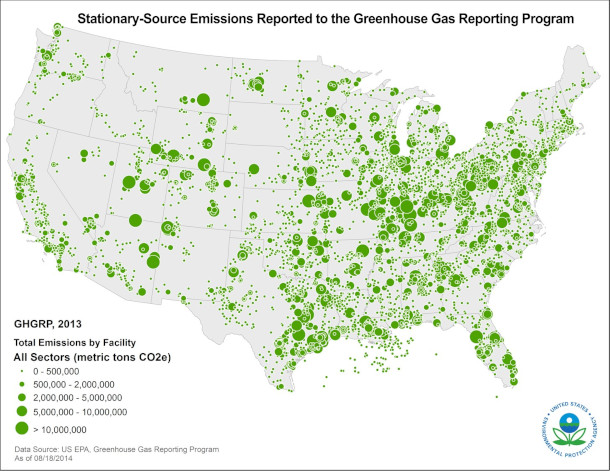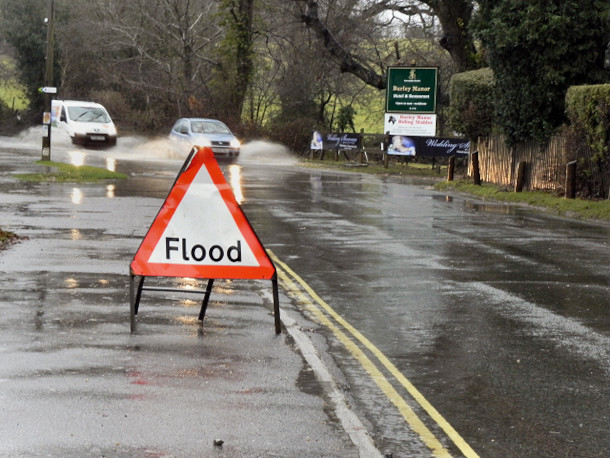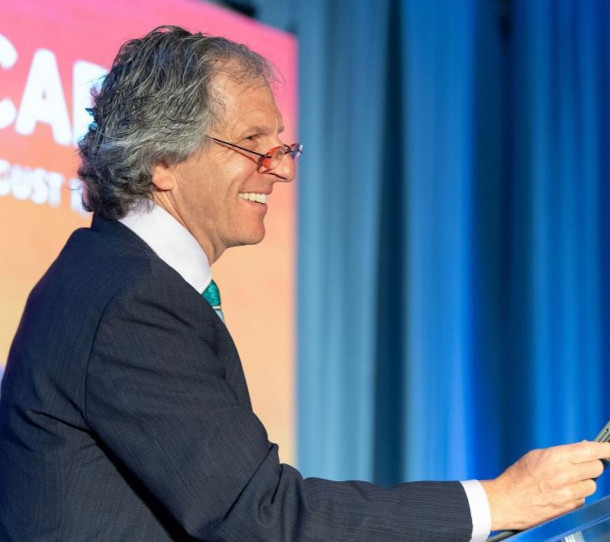The EPA Wants to Ignore GHG Emissions
Air Date: Week of September 26, 2025

Unchecked greenhouse gas emissions warm the planet. (Photo: ejstanz, Wikimedia Common, CC BY-SA 2.0)
The Environmental Protection Agency has proposed ending the Greenhouse Gas Reporting Program, which requires the biggest industrial facilities and power plants in the country to report their global warming emissions. David Cash, former EPA Administrator for Region One – New England, joins Host Aynsley O’Neill to discuss the potential consequences of this Trump Administration decision.
Transcript
O’NEILL: One of the ways the Trump administration is walking back climate policy is by attempting to cancel the Greenhouse Gas Reporting Program. David Cash is the former EPA Administrator for Region One New England and he’s here to tell us more. David, welcome back to the show!
CASH: Thanks. It's good to be here.
O'NEILL: So please describe for us the purpose of this reporting program. How does it work?
CASH: So when the reporting program was put in place about 15 years ago, it was a time where the United States was moving to start regulating greenhouse gasses, because all of the science was showing that climate change caused by fossil fuel emissions of greenhouse gasses caused a whole range of problems, everything from wildfires to sea level rise to coastal flooding to river flooding, and then all the kind of health problems that would come with that, you know, hot days in the city where asthma rates spike, for example. So of course, if you're needing to regulate something like a pollutant, you have to know how much of it there is. You have to know who's emitting it and when. And for that reason, the greenhouse gas reporting program was launched by EPA, and basically it requires about 8000 of the coal burning plants, natural gas plants, manufacturing facilities that use coal or gas or oil to report what their emissions are. And that way, EPA can track them. The states can track them. Their companies can track them so they can figure out how to be better corporate citizens and reduce their emissions. So that's how that got launched 15 years ago.
O'NEILL: So over these last 15 years, to what extent has the program been successful at creating this transparency in the industry?

The Greenhouse Gas Reporting Program has been responsible for emissions tracking across the country for over a decade. (Photo: USEPA)
CASH: It's been quite successful, we've been able to track who's emitting what amount of greenhouse gasses, and so as EPA and states have developed programs to limit the emissions, to protect human health and the environment, the reporting program has been the backbone of that. And if I could kind of take a step back and just think if there's any action that you want to take. Let's say you're a government or let's say you're just like in a household where you see a potential problem in your house, you're going to want to know what's happening. You're going to want to figure out, you know, if you have a leak in your roof, you're going to want to know, like, how much is it leaking? When does it leak? And if you can't measure that, then there's no way that you can protect from the damage that it might be caused by that. So it's a fundamental piece that monitoring and tracking things like emissions of pollutants is critically important to understanding how they happen, and more important to understand how you can stop them from hurting human health and the environment.
O'NEILL: And how do you think policymakers would respond to the end of this program? You know, what shape might greenhouse gas policy take if we continue down this path?
CASH: Well, it's clearly going to be harder to regulate them, and that's been a very outspoken goal of this administration as it's rolling back regulations and reducing grants that go for greenhouse gas reductions and the related, you know, particulates and local air pollution and things like that.

With the warming climate, the intensity and frequency of floods will only become more common. (Photo: David Dixon, Wikimedia Commons, CC BY-SA 2.0)
O'NEILL: And I can't help but also think about this in terms of record keeping and science, just generally speaking, it seems to me like this could create a data gap, which would prove difficult for future administrations.
CASH: Yeah, I think that's absolutely true, and not just future administrations, but states. There's some states that rely on the federal reporting. So some states have, and have historically, so I believe Massachusetts was one of the first states before the federal government that required greenhouse gas reporting, and that can be continued as well. And there'll be some states that will have that backstop, and others that don't, and so they're not going to be able to get the data that they need to make wise decisions in their states.
O'NEILL: And now I think I'm seeing that even with the elimination of the greenhouse gas reporting program, some fossil fuel facilities would still be required to disclose their emissions. Right? So what determines which facilities must report and which facilities are exempt?
CASH: Yeah, so there are some facilities, like natural gas pipelines, that are exempt from this reporting elimination, and that's because they were specifically identified in the Inflation Reduction Act. So are covered under a specific law that says they have to report.
O'NEILL: And now, David, how likely is it, do you think that we'll see pushback against this in the courts?
CASH: There's definitely going to be pushback as we see the administration pulling back from the reporting requirements and loosening up regulations we already are and you know, we're seeing that not just from your typical environmental group. Our national environmental groups, but we're seeing it from states. We know that attorneys general have filed lawsuits that are pushing back on the revoking of a variety of these kinds of regulations. And there are folks in the regulated community that like the certainty that comes along with the kind of reporting so that they know where they stand. They know where their competition stands. It's all part of the role that government plays of providing a level playing field in the sectors that emit greenhouse gasses.

David Cash is a former EPA Administrator for Region One New England. (Photo: David Cash)
O'NEILL: Now, David, last time we spoke to you, the Trump administration had put a stop work order on an offshore wind project called Revolution Wind. But more recently, a US District Court Judge for DC, Judge Royce Lamberth, has granted a preliminary injunction and allowed the project to resume work. What do you make of that?
CASH: This is good news. This is good news because Revolution Wind had followed all the rules. Had spent years and years and years studying the impacts of the project on the environment, on national security, on whales, on birds, on fish. The list is long, very, very long. It took many, many years, and there was nothing rushed about it at all. So there were many of us in this community when the stop work order came, just scratching our head on what basis, what criteria were used, and the stop work order didn't have anything specific, didn't provide evidence for why work was being stopped. There were some vague notions about national security, but as I said, there had been a full national security review during the permitting process. So this is a good step in which the legal system is acting as a backstop for actions that don't comport with the legal permitting process and the process by which a huge company with 1000s of jobs can move forward to bring clean energy to the communities that are hoping to clean up the air and address climate change and create jobs and lower electricity costs.
O'NEILL: David Cash is the former EPA Administrator for Region One, New England as always, thank you so much for joining us today.
CASH: Thank you, Aynsley.
Links
Learn more about the Greenhouse Gas Reporting Program
natlawreview | "EPA Proposes to Eliminate Greenhouse Gas Reporting Program"
Living on Earth wants to hear from you!
Living on Earth
62 Calef Highway, Suite 212
Lee, NH 03861
Telephone: 617-287-4121
E-mail: comments@loe.org
Newsletter [Click here]
Donate to Living on Earth!
Living on Earth is an independent media program and relies entirely on contributions from listeners and institutions supporting public service. Please donate now to preserve an independent environmental voice.
NewsletterLiving on Earth offers a weekly delivery of the show's rundown to your mailbox. Sign up for our newsletter today!
 Sailors For The Sea: Be the change you want to sea.
Sailors For The Sea: Be the change you want to sea.
 The Grantham Foundation for the Protection of the Environment: Committed to protecting and improving the health of the global environment.
The Grantham Foundation for the Protection of the Environment: Committed to protecting and improving the health of the global environment.
 Contribute to Living on Earth and receive, as our gift to you, an archival print of one of Mark Seth Lender's extraordinary wildlife photographs. Follow the link to see Mark's current collection of photographs.
Contribute to Living on Earth and receive, as our gift to you, an archival print of one of Mark Seth Lender's extraordinary wildlife photographs. Follow the link to see Mark's current collection of photographs.
 Buy a signed copy of Mark Seth Lender's book Smeagull the Seagull & support Living on Earth
Buy a signed copy of Mark Seth Lender's book Smeagull the Seagull & support Living on Earth

